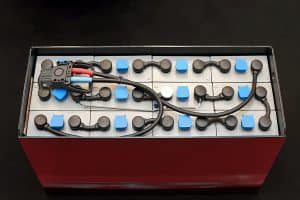Forklift battery maintenance tips

Here are the top forklift battery maintenance tips that will help you to avoid hurting forklift battery life. Follow these tips to help extend the life of a lift truck’s battery. This advice will also help eliminate the expense of needing to replace the unit prematurely. Be sure to always consult your battery seller or local forklift maintenance expert to ensure that you follow specific requirements for your make and model of battery.
Forklift battery maintenance tips
Don’t overcharge the battery
Avoid charging a forklift battery passed 100 per cent. This creates high temperatures that will result in overheating. And remember this: Heat damages batteries. So be sure to monitor charging and ensure processes or technologies are in place to stop charging when a unit hits 100 per cent.
Don’t under charge the battery
Make you you don’t end the battery’s charging cycle until it is full charged. The battery will drain much faster reducing the operating time to less than is optimal. This, of course, will hurt productivity.
Avoid extreme battery discharge
Never let a forklift battery’s charge to drop to zero. Allow the battery to discharge to 30 to 50 percent before recharging. Below that can be detrimental to the battery’s longevity.
Do not store a discharged battery
Always store a battery with a full charge. Don’t store a battery with a fully depleted charge. If you expect to store the battery for a prolonged long period of time, you should still check the charge periodically. An unused battery will lose its charge over time. Be sure to recharge stored batteries if stored for a long period of time. Why? Read on…
What is sulfation? And why it should be avoided
When a battery is fully discharged, white sulphuric crystals will appear on the unit’s lead plates. This is called “sulfation”. It is the biggest reason you should not store your battery with an empty charge. Development of these crystals will prevent a forklift battery from holding a healthy charge. Once sulfation of the lead plates happens, it becomes difficult to reverse the effects. In fact it becomes highly unlikely and will permanently damage the battery. Be sure to store batteries with a full charge to avoid this expensive problem.
Avoid extreme temperatures
Although AGM batteries — Absorbed Glass Mat batteries — do better in extreme temperatures than Flooded Batteries, very high and low temperatures can damage both types of batteries. The loose liquid in a Flooded Battery can be impacted during extreme temperatures. This will shorten the life of a battery because the liquid will either freeze or evaporate.
Seasonal Storage for Forklift Battery
If the seasonality of your business requires that equipment be stored for a period of time, then you need to take some precautionary steps. 1) Charge the battery to a full charge condition. 2) Be sure to inspect fluid levels both before and after charging. Note: deep cycle batteries should not be maintained with traditional offseason charging if you are unable to inspect fluid levels on a monthly basis. 3) During storage, disconnect the negative cable from the battery (or remove it from the equipment).
Review your forklift battery manual
Review your battery’s instruction manual and/or talk to your expert forklift battery provider to ensure that you will get the best life out of your lift truck battery. Often they will have helpful forklift battery maintenance tips and recommended maintenance routines that will help you get the maximum value and lifespan out of your batteries.

